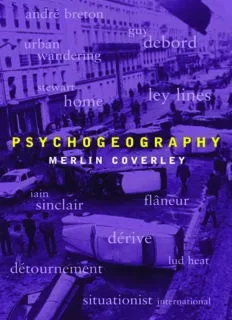
Psychogeography (Pocket Essential series) PDF
Preview Psychogeography (Pocket Essential series)
PSYCHOGEOPE 4/5/06 1:52 pm Page 2 Other titles in this series by the same author: London Writing PSYCHOGEOPE 4/5/06 1:52 pm Page 3 Psychogeography MERLIN COVERLEY POCKET ESSENTIALS PSYCHOGEOPE 4/5/06 1:52 pm Page 4 First published in 2006 by Pocket Essentials P.O.Box 394,Harpenden,Herts,AL5 1XJ www.pocketessentials.com © Merlin Coverley 2006 The right of Merlin Coverley to be identified as author of this work has been asserted in accordance with the Copyright,Designs and Patents Act 1988. All rights reserved.No part of this book may be reproduced,stored in or introduced into a retrieval system,or transmitted,in any form or by any means (electronic,mechanical,photocopying,recording or otherwise) without the written permission of the publishers. Any person who does any unauthorised act in relation to this publication may be liable to criminal prosecution and civil claims for damages. A CIP catalogue record for this book is available from the British Library. ISBN 1 904048 61 7 EAN 978 1 904048 61 9 2 4 6 8 10 9 7 5 3 1 Typeset by Avocet Typeset,Chilton,Aylesbury,Bucks Printed and bound in Great Britain by CPD Ltd,Ebbw Vale,Wales PSYCHOGEOPE 4/5/06 1:52 pm Page 5 To Catherine PSYCHOGEOPE 4/5/06 1:52 pm Page 6 PSYCHOGEOPE 4/5/06 1:52 pm Page 7 Contents Introduction 9 1: London and the Visionary Tradition 31 Daniel Defoe and the Re-Imagining of London; William Blake and the Visionary Tradition;Thomas De Quincey and the Origins of the Urban Wanderer; Robert Louis Stevenson and the Urban Gothic;Arthur Machen and the Art of Wandering;Alfred Watkins and the Theory of Ley Lines 2: Paris and the Rise of the Flâneur 57 Poe,Baudelaire and the Man of the Crowd;Walter Benjamin and the Arcades Project; Robinson and the Mental Traveller; Psycho- geography & Surrealism 3: Guy Debord and the Situationist 81 International The Pre-Situationist Movements; The Situationist International (1957–1972);Walking the City with Michel de Certeau • 7 • PSYCHOGEOPE 4/5/06 1:52 pm Page 8 CONTENTS 4: Psychogeography Today 111 JG Ballard and the Death of Affect; Iain Sinclair and the Re- Branding of Psychogeography; Peter Ackroyd and the New Anti- quarianism; Stewart Home and the London Psychogeographical Association;Patrick Keiller and the Return of Robinson Psychogeographical Groups, 141 Organisations and Websites Bibliography & Further Reading 147 Index 153 • 8 • PSYCHOGEOPE 4/5/06 1:52 pm Page 9 Introduction Psychogeography: a beginner’s guide. Unfold a street map of London,place a glass,rim down,anywhere on the map,and draw round its edge.Pick up the map,go out into the city,and walk the circle,keeping as close as you can to the curve.Record the expe- rience as you go,in whatever medium you favour:film,photo- graph,manuscript,tape.Catch the textual run-off of the streets; the graffiti,the branded litter,the snatches of conversation.Cut for sign.Log the data-stream.Be alert to the happenstance of metaphors, watch for visual rhymes, coincidences, analogies, family resemblances,the changing moods of the street.Complete the circle,and the record ends.Walking makes for content;footage for footage. Robert MacFarlane,A Road of One’s Own.1 Psychogeography.A term that has become strangely familiar – strange because, despite the frequency of its usage, no one seems quite able to pin down exactly what it means or where it comes from.The names are familiar too: Guy Debord and the situationists, Iain Sinclair and Peter Ackroyd, Stewart Home and Will Self. Are they all involved? And if so, in what? Are we talking about a pre- dominantly literary movement or a political strategy, a • 9 • PSYCHOGEOPE 4/5/06 1:52 pm Page 10 PSYCHOGEOGRAPHY series of new age ideas or a set of avant-garde practices? The answer, of course, is that psychogeography is all of these things,resisting definition through a shifting series of interwoven themes and constantly being reshaped by its practitioners. The origins of the term are less obscure and can be traced back to Paris in the 1950s and the Lettrist Group,a forerunner of the Situationist International. Under the stewardship of Guy Debord, psychogeography became a tool in an attempt to transform urban life, first for aes- thetic purposes but later for increasingly political ends. Debord’s oft-repeated ‘definition’ of psychogeography describes ‘The study of the specific effects of the geo- graphical environment, consciously organised or not, on the emotions and behaviour of individuals’2 and,in broad terms,psychogeography is,as the name suggests,the point at which psychology and geography collide, a means of exploring the behavioural impact of urban place.And yet this term is, according to Debord, one with a ‘pleasing vagueness’3.This is just as well,because,since his day,the term has become so widely appropriated and has been used in support of such a bewildering array of ideas that it has lost much of its original significance. Debord was fiercely protective of his brainchild and dis- missive of attempts to establish psychogeography within the context of earlier explorations of the city.But psycho- geography has resisted its containment within a particular time and place. In escaping the stifling orthodoxy of Debord’s situationist dogma,it has found both a revival of • 10 •
Description: